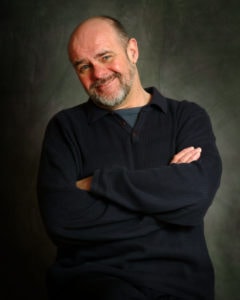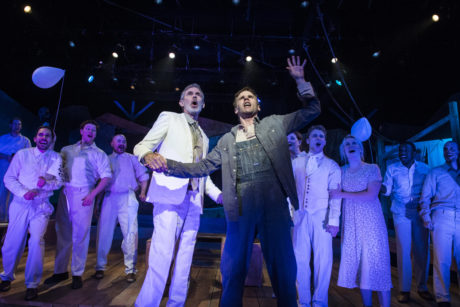It’s one of my favorite musicals and I am thrilled that Nick Olcott is directing 1st Stage’s production of Floyd Collins, which plays through June 26th.
Joel: Floyd Collins is rarely produced and is one of my favorite scores. What is it about this musical that made you want to direct it?

Nick: I was drawn to the beauty of its music and the power of its storytelling. Floyd Collins is a compelling tale of the search for meaning in life, with both the glory and heartache that search can bring. The piece is intensely personal, portraying one family’s tragedy, and at the same time startlingly political, exposing how a nation can turn tragedy into an entertainment event. Knowing that it is a true story from 1925, at the dawn of the mass media age, makes it resonate profoundly today.
How would you describe Adam Guettel’s score and what audiences can expect to hear when they come to see the show?
The music manages to be simultaneously incredibly complex and completely accessible. Easily hummable American roots music tunes undergo complex harmonic and rhythmic variations that serve to deepen and enrich the storytelling. As with all good theatre music, the music lets us hear the characters’ internal lives. First-time hearers can enjoy the beautiful melodies and catchy tunes; students of the art form can revel in the score’s superb artistry. Everyone will find themselves caught up in the story the music tells.
How does the intimate 1st Stage performance space help to tell the story of Floyd Collins? What have been some of the challenges working in the space and directing the show?
An intimate space is the ideal venue for this music. We need to be near Floyd, in essence be in the cave with him. In a larger venue, that sense of immediacy is lost. But at 1st Stage, we’re right there. The challenge is how to alternate scenes of one man trapped in a small space underground with crowd scenes unfolding on the field above him. Our set designer, Joe Musumeci, has come up with an ingenious environment that makes this happen.
Please introduce us to your cast and tell us what has impressed you most about their performances?

It’s a big cast, so get ready.
Central to the project is Evan Casey as Floyd. The moment Artistic Director Alex Levy approached me about the piece, I thought of Evan. I can’t imagine doing it with anyone but him. He brings the intensity of a driven man to the stage, yet his mysterious smile always hints at the passionate and playful spirit inside. And can the man sing!
We’re incredibly lucky to have Maggie Donnelly as Floyd’s sister Nellie. The character is a difficult one, a mentally disturbed woman who believes she has mystical powers. It could easily be a cliche or a caricature, but Maggie makes Nellie heartbreakingly real. Wait until you hear her voice.
Floyd’s brother Homer is in the capable hands of the charming John Sygar, with whom I’ve had the honor to work before. John bring unbridled youthful energy and naiveté to the stage and makes them totally believable. Did I mention his voice?
Scott Sedar and Jennifer Lyons Pagnard play Floyd’s father and stepmother. Scott is a well-known figure in Washington theatre with whom I’ve had the privilege of working for over thirty years. You think gravitas, you think Scott Sedar. We’re lucky to have nabbed Jennifer upon her retirement as lead vocalist for the U. S. Air Force Band. Her voice has been thrilling audiences across the nation since 1992, and now we have her with us.
Edward C. Nagel plays the ambitious, but ethically torn, reporter Skeets Miller, who made his career off of Floyd’s tragedy. Teddy bring such honesty to the role that you love the character even as you watch his actions unleash the media storm upon the Collins family.
A trio of Washington theatre regulars play Floyd’s neighbors: Frank Britton, Harrison Smith, and Carl Williams. These talented actors make the world of rural Kentucky come to life with their grounded, realistic portrayals. And Harrison even plays the guitar, which the script requires!
A quartet of versatile singing actors round out the world, each playing numerous characters. Joshua Simon is perhaps most memorable as H.T. Carmichael, the mining engineer who arrives upon the scene convinced that he can get Floyd out and soon learns the limitations of his own power.
Benjamin Lurye turns on the charm as the ambitious filmmaker who exploits the newly invented medium of the newsreel to advance his career.
Ben then joins Hasani Allen and Russell Silber to form a trio of sensationalist newspapermen who fuel the media circus. These three “triple threats” have all the razzmatazz one could ask for in the piece’s one real production number, as their singing, dancing, and acting bring the media circus to life.
How many musicians are playing the score?
Musical Director William Yanesh has assembled three incredible string plays and a multi-talented percussionist to join him as he conducts from the keyboard. You won’t believe it’s just five people producing the sound you hear from the orchestra. You’ll swear there’s a banjo, a hammer dulcimer, a tub bass, and several guitars back there. (Of course, there is one guitar on stage). Several of the string players have been in involved in other productions of Floyd Collins, and they jumped at the chance to play the score again. So you know it’s a real musician’s piece!
How does the work of your designers help to tell the story and bring your vision to the stage?
I’ve already mentioned how Joe Musumeci’s brilliant set makes it possible for us to go from an twisting underground passageway to a rain-drenched filed in seconds.
Kenny Neal’s sound design is an essential part of that as well, making us believe rocks are falling, power drills are hammering, and steam shovels are breaking up the earth. And the cave echoes are amazing!
Brian Allard’s lights are a thing of beauty, able to give us harsh reality, breathtaking natural beauty, and fantasy landscapes of the mind. And all in a building with limited electrical capabilities.
Robert A. Croghan has worked miracles on a tight budget, giving us a believable world of Kentucky circa 1925, clearly delineating who’s from “around here” and who’s and “outlander.” He’s also achieved some of the quickest and most effective quick changes I’ve ever seen.
Deb Crerie and Kay Rzasa have found and created a wonderful array of vintage props that ground us firmly in the physical world of the time and place. Their research into period newspapers also helped us all understand the reality of the press that swirled around Floyd.
What issues and themes can today’s theatre goers relate to while watching Floyd Collins?
The carnival that erupts around Floyd’s entrapment reveals the birth of today’s twenty-four hour news cycle, churning out hyperbole, exaggeration, and downright lies in order to feed an endless appetite for sensation. This piece can make us examine why it is we want and need to feel on tragedy like this.
What have been some of the biggest surprises that you have encountered during rehearsals and what do you want audiences to take with them about after seeing Floyd Collins?
The biggest surprise for me in working on the pieces was discovering how much of it is about family and the love that binds it together. There is no traditional love song in Floyd Collins. But there’s a wonderful duet for a long-married couple with difficult children realizing that for all the problems, they wouldn’t have their family any other way. There’s a duet of breathtaking beauty between a brother and a sister. And the show’s most infectious number is a duet about brotherly love. Audiences come away with the feeling that whatever the challenges and whatever the tragedies, family really is the most important thing in the world.
Floyd Collins plays through June 26, 2016 at 1st Stage – 1524 Spring Hill Road, in Tysons, VA. For tickets, call (703) 854-1856, or purchase them online.





